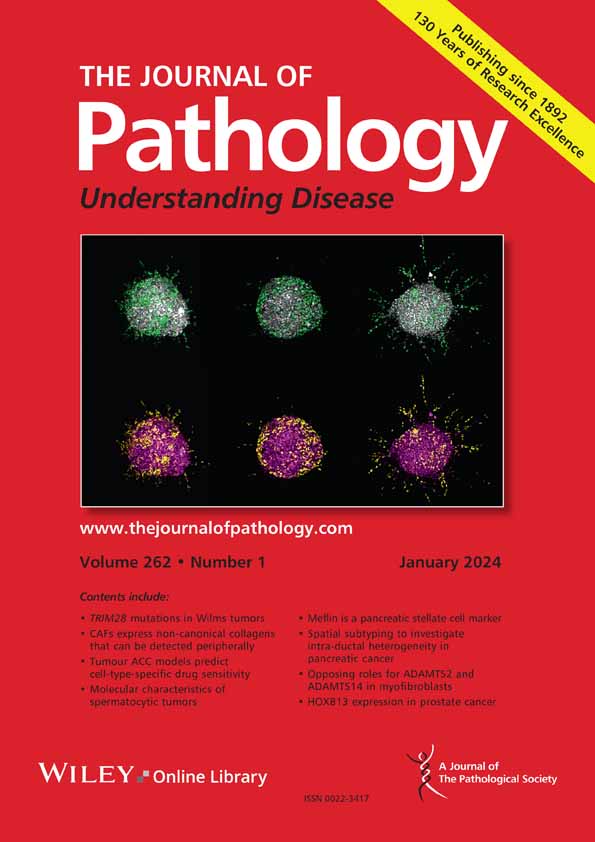Nerve growth factor inducible (VGF) is a secreted mediator for metastatic breast cancer tropism to the brain
Rita Carvalho, Liliana Santos, Inês Conde, Ricardo Leitão, Hugo RS Ferreira, Célia Gomes, Ana Paula Silva, Fernando Schmitt, Carina Carvalho-Maia, João Lobo, Carmen Jerónimo, Joana Paredes, Ana Sofia Ribeiro
求助PDF
{"title":"Nerve growth factor inducible (VGF) is a secreted mediator for metastatic breast cancer tropism to the brain","authors":"Rita Carvalho, Liliana Santos, Inês Conde, Ricardo Leitão, Hugo RS Ferreira, Célia Gomes, Ana Paula Silva, Fernando Schmitt, Carina Carvalho-Maia, João Lobo, Carmen Jerónimo, Joana Paredes, Ana Sofia Ribeiro","doi":"10.1002/path.6319","DOIUrl":null,"url":null,"abstract":"<p>Brain metastases are one of the most serious clinical problems in breast cancer (BC) progression, associated with lower survival rates and a lack of effective therapies. Thus, to dissect the early stages of the brain metastatic process, we studied the impact of brain organotropic BC cells’ secretomes on the establishment of the brain pre-metastatic niche (PMN). We found that BC cells with specific tropism to the brain caused significant blood–brain barrier (BBB) disruption, as well as microglial activation, in both <i>in vitro</i> and <i>in vivo</i> models. Further, we searched for a brain-organotropic metastatic signature, as a promising source for the discovery of new biomarkers involved in brain metastatic progression. Of relevance, we identified VGF (nerve growth factor inducible) as a key mediator in this process, also impacting the BBB and microglial functions both <i>in vitro</i> and <i>in vivo</i>. In a series of human breast tumors, VGF was found to be expressed in both cancer cells and the adjacent stroma. Importantly, VGF-positive tumors showed a significantly worse prognosis and were associated with HER2 (human epidermal growth factor receptor 2) overexpression and triple-negative molecular signatures. Further clinical validation in primary tumors from metastatic BC cases showed a significant association between VGF and the brain metastatic location, clearly and significantly impacting on the prognosis of BC patients with brain metastasis. In conclusion, our study reveals a unique secretome signature for BC with a tropism for the brain, highlighting VGF as a crucial mediator in this process. Furthermore, its specific impact as a poor prognostic predictor for BC patients with brain metastasis opens new avenues to target VGF to control the progression of brain metastatic disease. © 2024 The Pathological Society of Great Britain and Ireland.</p>","PeriodicalId":232,"journal":{"name":"The Journal of Pathology","volume":"264 2","pages":"132-147"},"PeriodicalIF":5.6000,"publicationDate":"2024-07-29","publicationTypes":"Journal Article","fieldsOfStudy":null,"isOpenAccess":false,"openAccessPdf":"","citationCount":"0","resultStr":null,"platform":"Semanticscholar","paperid":null,"PeriodicalName":"The Journal of Pathology","FirstCategoryId":"3","ListUrlMain":"https://onlinelibrary.wiley.com/doi/10.1002/path.6319","RegionNum":2,"RegionCategory":"医学","ArticlePicture":[],"TitleCN":null,"AbstractTextCN":null,"PMCID":null,"EPubDate":"","PubModel":"","JCR":"Q1","JCRName":"ONCOLOGY","Score":null,"Total":0}
引用次数: 0
引用
批量引用
Abstract
Brain metastases are one of the most serious clinical problems in breast cancer (BC) progression, associated with lower survival rates and a lack of effective therapies. Thus, to dissect the early stages of the brain metastatic process, we studied the impact of brain organotropic BC cells’ secretomes on the establishment of the brain pre-metastatic niche (PMN). We found that BC cells with specific tropism to the brain caused significant blood–brain barrier (BBB) disruption, as well as microglial activation, in both in vitro and in vivo models. Further, we searched for a brain-organotropic metastatic signature, as a promising source for the discovery of new biomarkers involved in brain metastatic progression. Of relevance, we identified VGF (nerve growth factor inducible) as a key mediator in this process, also impacting the BBB and microglial functions both in vitro and in vivo . In a series of human breast tumors, VGF was found to be expressed in both cancer cells and the adjacent stroma. Importantly, VGF-positive tumors showed a significantly worse prognosis and were associated with HER2 (human epidermal growth factor receptor 2) overexpression and triple-negative molecular signatures. Further clinical validation in primary tumors from metastatic BC cases showed a significant association between VGF and the brain metastatic location, clearly and significantly impacting on the prognosis of BC patients with brain metastasis. In conclusion, our study reveals a unique secretome signature for BC with a tropism for the brain, highlighting VGF as a crucial mediator in this process. Furthermore, its specific impact as a poor prognostic predictor for BC patients with brain metastasis opens new avenues to target VGF to control the progression of brain metastatic disease. © 2024 The Pathological Society of Great Britain and Ireland.
神经生长因子诱导因子(VGF)是乳腺癌向脑部转移的分泌介质。
脑转移是乳腺癌(BC)进展过程中最严重的临床问题之一,与较低的生存率和缺乏有效疗法有关。因此,为了剖析脑转移过程的早期阶段,我们研究了脑器质性BC细胞分泌物对脑转移前生态位(PMN)建立的影响。我们发现,在体外和体内模型中,对大脑有特异性滋养作用的BC细胞会导致血脑屏障(BBB)严重破坏以及小胶质细胞活化。此外,我们还寻找了脑器质性转移特征,以此作为发现脑转移进展中新生物标志物的可能来源。与此相关的是,我们发现 VGF(神经生长因子诱导因子)是这一过程中的关键介质,在体外和体内也会影响 BBB 和小胶质细胞的功能。在一系列人类乳腺肿瘤中,VGF 在癌细胞和邻近基质中均有表达。重要的是,VGF 阳性的肿瘤预后明显较差,并与 HER2(人表皮生长因子受体 2)过表达和三阴性分子特征有关。在转移性 BC 病例的原发肿瘤中进行的进一步临床验证显示,VGF 与脑转移位置有显著关联,对脑转移 BC 患者的预后有明显影响。总之,我们的研究揭示了一种独特的对脑部有趋向性的 BC 分泌组特征,突出了 VGF 在这一过程中的关键介质作用。此外,其作为脑转移 BC 患者不良预后预测因子的特殊影响为靶向 VGF 控制脑转移疾病的进展开辟了新途径。© 2024 大不列颠及爱尔兰病理学会。
本文章由计算机程序翻译,如有差异,请以英文原文为准。


